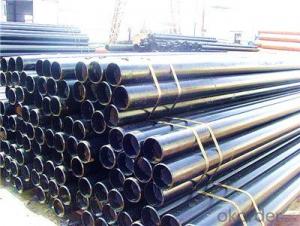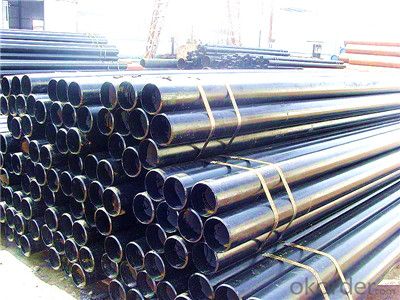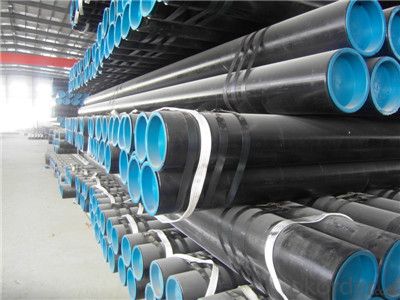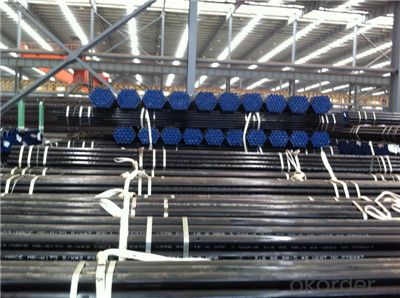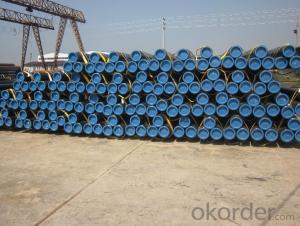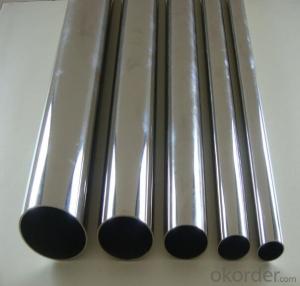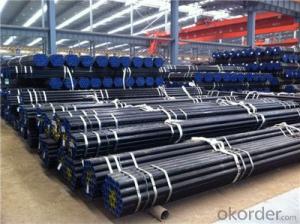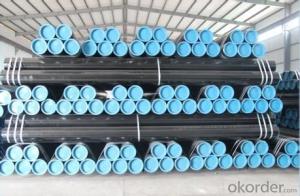High Quality Seamless Steel Pipe with Best Price
- Loading Port:
- Tianjin
- Payment Terms:
- TT OR LC
- Min Order Qty:
- 100 m.t.
- Supply Capability:
- 200000 m.t./month
OKorder Service Pledge
OKorder Financial Service
You Might Also Like
PRODUCT DETAILS
1.Structure of Seamless Steel Pipe Description:
A large amount of Seamless Steel Pipes is offered to the clients at cost effective rates. These pipes are extremely durable, resistant to corrosion and have high tensile strength. Our pipes are used in nuclear plants, power plants, refineries and construction industry across the country. Furthermore, we are capable of providing these seamless pipes to the clients in bulk quantity.
2.Main Features of the Steel Pipe:
• High manufacturing accuracy
• High strength
• Small inertia resistance
• Strong heat dissipation ability
• Good visual effect
•Reasonable price
3.Seamless Steel Pipe Specification:
| Standard: | GB, DIN, ASTM,ASME, ASTM A106-2006, ASTM A53-2007 |
| Grade: | 10#,20#, 45#, 16Mn |
Thickness: | 8 - 33 mm |
| Section Shape: | Round |
| Outer Diameter: | 133 - 219 mm |
| Place of Origin: | Shandong, China (Mainland) |
| Secondary Or Not: | Non-secondary |
| Application: | Hydraulic Pipe |
| Technique: | Cold Drawn |
| Certification: | API |
| Surface Treatment: | factory state or painted black |
| Special Pipe: | API Pipe |
| Alloy Or Not: | Non-alloy |
| Length: | 5-12M |
| Outer Diameter: | 21.3-610mm |
| Packaging Details: | Seaworthy packages, bundles wrapped with strong steel strip |
4.Product pictures
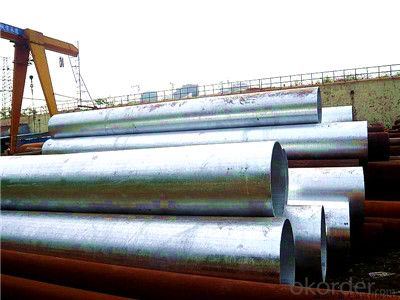
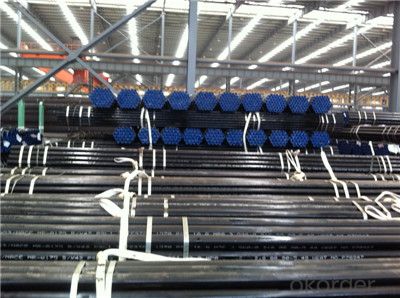
5.FAQ of Seamless steel pipe:
①How is the quality of your products?
Our products are manufactured strictly according to national and internaional standard, and we take a test
on every pipe before delivered out. If you want see our quality certifications and all kinds of testing report, please just ask us for it.
Guaranteed: If products’ quality don’t accord to discription as we give or the promise before you place order, we promise 100% refund.
②How about price?
Yes, we are factory and be able to give you lowest price below market one, and we have a policy that “ for saving time and absolutely honest business attitude, we quote as lowest as possible for any customer, and discount can be given according to quantity”,if you like bargain and factory price is not low enough as you think, just don’t waste your time.Please trust the quotation we would give you, it is professional one.
③Why should you chose us?
Chose happens because of quality, then price, We can give you both.Additionally, we can also offer professional products inquiry, products knowledge train(for agents), smooth goods delivery, exellent customer solution proposals.Our service formula: good quality+good price+good service=customer’s trust.
SGS test is available, customer inspection before shipping is welcome, third party inspection is no problem.
- Q: Can steel pipes be used for airport construction?
- Yes, steel pipes can be utilized in the construction of airports. In the construction industry, steel pipes find widespread application, including in airports. They are often employed for underground utilities like water and sewage lines, as well as for structural purposes such as providing support to the airport terminal building. The utilization of steel pipes for airport construction offers several advantages. Firstly, they possess remarkable strength and durability, making them capable of handling heavy loads and enduring unfavorable weather conditions. This attribute is crucial for ensuring the security and stability of airport structures. Secondly, steel pipes are highly versatile and can be easily tailored to meet specific project requirements. They are available in various sizes and thicknesses, providing flexibility in both design and construction. Moreover, steel pipes can be welded or joined together to form longer sections, which simplifies installation and reduces construction time. Furthermore, steel pipes exhibit resistance to corrosion, a vital characteristic in airports where constant exposure to moisture, salt, and other environmental factors is common. This resistance to corrosion guarantees the longevity and dependability of the infrastructure. Lastly, in comparison to materials like concrete or PVC, steel pipes offer a cost-effective solution. They necessitate relatively low maintenance and boast a long lifespan, thereby minimizing the need for frequent repairs or replacements and ultimately saving time and money in the long term. In conclusion, due to their strength, durability, versatility, corrosion resistance, and cost-effectiveness, steel pipes are a suitable choice for airport construction.
- Q: Can steel pipes be used for transporting liquids?
- Yes, steel pipes can be used for transporting liquids. Steel pipes offer excellent strength, durability, and resistance to corrosion, making them suitable for various applications, including the transportation of liquids such as water, oil, and gas.
- Q: What is the difference between steel pipe and fiberglass pipe?
- Steel pipe and fiberglass pipe differ in terms of material composition, durability, flexibility, and cost. Steel pipe is made of steel, which provides strength and resilience, making it ideal for high-pressure applications and underground installations. Fiberglass pipe, on the other hand, is composed of reinforced plastic fibers, resulting in a lightweight and corrosion-resistant material suitable for above-ground and corrosive environments. While steel pipe offers higher tensile strength, fiberglass pipe excels in its flexibility, allowing for easier installation and reduced maintenance. Additionally, steel pipe is typically more expensive due to the cost of materials and manufacturing processes, while fiberglass pipe is more cost-effective in terms of initial installation and long-term maintenance.
- Q: What are the environmental impacts of steel pipe production?
- The environmental impacts of steel pipe production include carbon dioxide emissions from the extraction and processing of raw materials, such as iron ore and coal, as well as the energy-intensive manufacturing process. Additionally, the production of steel pipes can contribute to air and water pollution through the release of pollutants and waste materials. The extraction and transportation of raw materials may also result in habitat destruction and disruptions to ecosystems.
- Q: What are the different end finishes for steel pipes?
- The different end finishes for steel pipes include plain ends, beveled ends, threaded ends, and grooved ends.
- Q: What's the gate number of the precision steel pipe?
- This kind of steel tube and ordinary hot-rolled seamless steel pipe and cold drawn seamless steel tube in the outer surface is different from the outer surface, and the diameter of the smooth finish of precision steel tube, stainless steel color and the same, inside and outside surface due to manufacturing reasons with a layer of oil.
- Q: How to make the internal tooth of the steel pipe?
- Compared with the ordinary light pipe, tube can effectively prevent the formation of steam film between the seal and the pipe wall, increase the light disturbance flow inside the tube, the tube wall temperature is more uniform, which can avoid the light pipe damage, and improve the heat transfer efficiency of boiler. The number of thread head of internal thread pipe is 4, 6 head and 8 head according to need. The main materials are 20G, SA210C, T2, T12, 12Cr1MoVG, 15CrMoG, T22, T23 and so on. China needs 2.5~3.0 tons per year of inner thread tube.
- Q: How are steel pipes classified based on their thickness?
- Steel pipes can be classified based on their thickness into three main categories: Schedule, Nominal Pipe Size (NPS), and Wall Thickness. The Schedule classification is commonly used in North America and refers to the wall thickness of the pipe. It is denoted by numbers such as Schedule 10, Schedule 40, and Schedule 80, where the higher the number, the thicker the pipe. The Nominal Pipe Size (NPS) classification, on the other hand, is used internationally and refers to the inside diameter of the pipe. It is expressed in inches and is usually followed by a schedule number to indicate the wall thickness. For instance, NPS 6 Schedule 40 means a pipe with a 6-inch inside diameter and a wall thickness according to Schedule 40. Lastly, steel pipes can also be classified based on their wall thickness in millimeters or inches. This classification provides a more precise measurement of the pipe's thickness, usually referred to as the "wall thickness" or "wt" in specifications. The wall thickness is measured from the outside diameter to the inside diameter and can be expressed in various units of measurement, such as millimeters, inches, or gauge. In conclusion, steel pipes are classified based on their thickness using different systems such as Schedule, Nominal Pipe Size (NPS), and Wall Thickness. These classifications help ensure that the appropriate pipe is selected for specific applications, considering factors such as pressure requirements, structural integrity, and compatibility with other components of the system.
- Q: What is the difference between internal threading and external threading of steel pipes?
- The difference between internal threading and external threading of steel pipes lies in the location and method of threading. Internal threading refers to the process of creating threads on the inside surface of a steel pipe, allowing it to be connected to other components with external threads. On the other hand, external threading involves creating threads on the outside surface of a steel pipe, enabling it to be joined with components having internal threads. These two methods serve different purposes and are utilized depending on the specific requirements of the plumbing or assembly project.
- Q: How are steel pipes transported from the manufacturing site to the construction site?
- Steel pipes are typically transported from the manufacturing site to the construction site using various methods such as trucks, trains, ships, or even by air. The most common mode of transportation is trucks, which allow for easy and efficient delivery directly to the construction site.
Send your message to us
High Quality Seamless Steel Pipe with Best Price
- Loading Port:
- Tianjin
- Payment Terms:
- TT OR LC
- Min Order Qty:
- 100 m.t.
- Supply Capability:
- 200000 m.t./month
OKorder Service Pledge
OKorder Financial Service
Similar products
Hot products
Hot Searches
Related keywords
